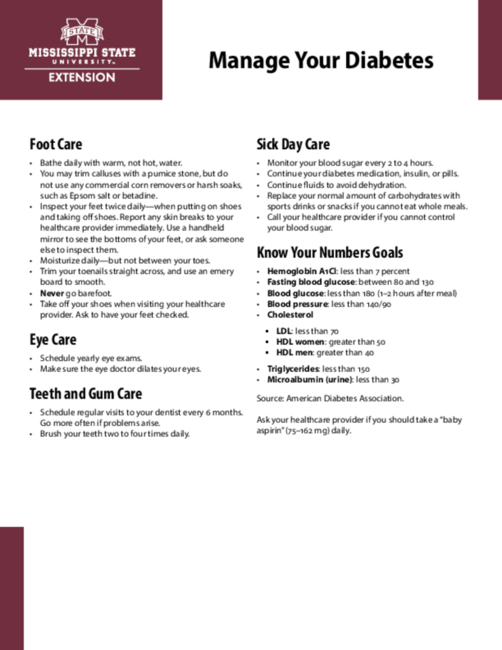IS1781
Manage Your Diabetes
Foot Care
- Bathe daily with warm, not hot, water.
- You may trim calluses with a pumice stone, but do not use any commercial corn removers or harsh soaks, such as Epsom salt or betadine.
- Inspect your feet twice daily—when putting on shoes and taking off shoes. Report any skin breaks to your healthcare provider immediately. Use a handheld mirror to see the bottoms of your feet, or ask someone else to inspect them.
- Moisturize daily—but not between your toes.
- Trim your toenails straight across, and use an emery board to smooth.
- Never go barefoot.
- Take off your shoes when visiting your healthcare provider. Ask to have your feet checked.
Eye Care
- Schedule yearly eye exams.
- Make sure the eye doctor dilates your eyes.
Teeth and Gum Care
- Schedule regular visits to your dentist every 6 months. Go more often if problems arise.
- Brush your teeth two to four times daily.
Sick Day Care
- Monitor your blood sugar every 2 to 4 hours.
- Continue your diabetes medication, insulin, or pills.
- Continue fluids to avoid dehydration.
- Replace your normal amount of carbohydrates with sports drinks or snacks if you cannot eat whole meals.
- Call your healthcare provider if you cannot control your blood sugar.
Know Your Numbers Goals
- Hemoglobin A1Cl: less than 7 percent
- Fasting blood glucose: between 80 and 130
- Blood glucose: less than 180 (1–2 hours after meal)
- Blood pressure: less than 140/90
- Cholesterol
- LDL: less than 70
- HDL women: greater than 50
- HDL men: greater than 40
- Triglycerides: less than 150
- Microalbumin (urine): less than 30
Source: American Diabetes Association.
Ask your healthcare provider if you should take a “baby aspirin” (75–162 mg) daily.
Information Sheet 1781 (POD-05-24)
Reviewed by Qula Madkin, MS, RDN, LD, CDCES, Extension Instructor, Biochemistry, Nutrition, and Health Promotion, from a previous edition by Katherine Parman, RN, CDE, CPT, Clinician for the Diabetes Treatment Center of North Mississippi Medical Center – Tupelo and President of the Mississippi Association of Diabetes Educators (2005–2007). Previously revised by David Buys, PhD, MSPH, CPH, Associate Professor, Health Sciences Administration; and Victorian Tilley, former Graduate Research Assistant, Food Science, Nutrition, and Health Promotion.
The Mississippi State University Extension Service is working to ensure all web content is accessible to all users. If you need assistance accessing any of our content, please email the webteam or call 662-325-2262.
Authors
-
 Extension Instructor
Extension Instructor- Central MS Research & Ext Center
